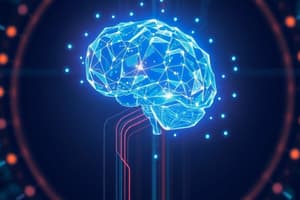Podcast
Questions and Answers
What is the main function of Data in AI systems?
What is the main function of Data in AI systems?
- Model the human thought process
- Use algorithms that learn from data
- Provide cloud services and computing systems support
- Assist in reasoning and decision-making (correct)
Which AI approach uses neural networks with multiple layers?
Which AI approach uses neural networks with multiple layers?
- Cognitive Computing
- Symbolic AI
- Deep Learning (correct)
- Machine Learning
What ethical concern arises due to the lack of transparency in AI decision-making?
What ethical concern arises due to the lack of transparency in AI decision-making?
- Security threats
- Mistrust and misinformation (correct)
- Privacy violations
- Bias
Which AI approach represents knowledge using symbols and rules for reasoning?
Which AI approach represents knowledge using symbols and rules for reasoning?
What type of decision-making can AI systems' lack of transparency lead to?
What type of decision-making can AI systems' lack of transparency lead to?
Which component of AI involves cloud services and computing systems support?
Which component of AI involves cloud services and computing systems support?
What field of computer science focuses on creating machines capable of intellectual tasks that would normally require human-level intelligence?
What field of computer science focuses on creating machines capable of intellectual tasks that would normally require human-level intelligence?
In which decade did mathematicians and computer scientists begin exploring the potential of creating intelligent machines?
In which decade did mathematicians and computer scientists begin exploring the potential of creating intelligent machines?
Which component of AI refers to the physical parts like processors, memory, and storage?
Which component of AI refers to the physical parts like processors, memory, and storage?
What led to the creation of the first AI programs in the 1950s?
What led to the creation of the first AI programs in the 1950s?
Which era saw a resurgence in AI due to the advent of machine learning and deep learning techniques?
Which era saw a resurgence in AI due to the advent of machine learning and deep learning techniques?
What are the algorithms and tools that implement AI referred to as?
What are the algorithms and tools that implement AI referred to as?
Flashcards are hidden until you start studying
Study Notes
Artificial Intelligence Fundamentals
Artificial intelligence (AI) is a rapidly growing field of computer science that focuses on creating machines capable of intellectual tasks that would normally require human-level intelligence, such as visual perception, speech recognition, decision-making, and language translation. AI has evolved from rule-based systems and logic to machine learning and cognitive computing. This article provides an overview of AI fundamentals, including its history, components, approaches, and ethical considerations.
History of Artificial Intelligence
The concept of AI can be traced back to the 1940s and 1950s, when mathematicians and computer scientists began to explore the potential of creating intelligent machines. Early work in AI was influenced by the development of computers, which led to the creation of the first AI programs in the 1950s. Since then, AI has seen rapid advancements, with significant developments in the 1970s and 1980s, and a resurgence in the 1990s and 2000s due to the advent of machine learning and deep learning techniques.
Components of Artificial Intelligence
Artificial intelligence is composed of several interconnected components:
- Hardware: The physical components that enable AI, such as processors, memory, and storage.
- Software: The algorithms and tools that implement AI, including machine learning libraries and frameworks.
- Data: The information used by AI systems to learn and make decisions, such as images, speech, and text.
- Infrastructure: The cloud services and computing systems that support AI, including servers, storage, and networking.
Approaches to Artificial Intelligence
There are several approaches to AI, each with its own strengths and weaknesses:
- Symbolic AI: Also known as rule-based or expert systems, symbolic AI represents knowledge using symbols and rules that humans use to reason.
- Machine Learning: This approach uses algorithms that learn from data to make predictions and decisions without being explicitly programmed.
- Deep Learning: A subset of machine learning that uses neural networks with multiple layers to learn and make decisions.
- Cognitive Computing: This approach models the human thought process to make decisions and solve problems.
Ethical Considerations in Artificial Intelligence
As AI becomes more widespread, it raises ethical concerns, including:
- Bias: AI systems can perpetuate and amplify existing biases, leading to unfair or discriminatory outcomes.
- Transparency: The lack of transparency in AI decision-making can lead to mistrust and misinformation.
- Privacy: AI systems can collect and use personal data in ways that violate privacy rights.
- Security: AI can be used to create new threats, such as deepfakes and autonomous weapons.
Conclusion
Artificial intelligence is a complex field with a rich history and a wide range of applications. Understanding its fundamentals, including its components, approaches, and ethical considerations, is essential for anyone interested in working with AI. As AI continues to evolve and become more integrated into society, it will be crucial for individuals and organizations to stay informed about its developments and implications.
Studying That Suits You
Use AI to generate personalized quizzes and flashcards to suit your learning preferences.




